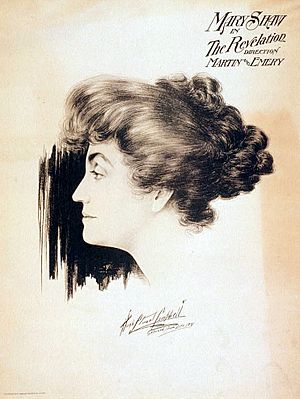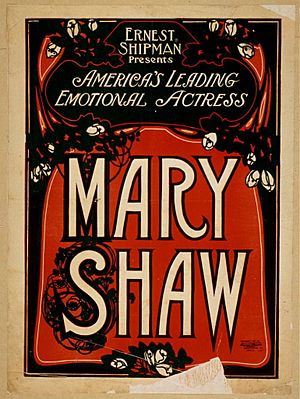Mary Shaw (actress) facts for kids
Mary G. Shaw (born January 25, 1854 – died May 18, 1929) was an American actress and writer. She was also a strong supporter of women's rights. She worked for women's suffrage, which meant giving women the right to vote. She was also an early feminist, someone who believes in equal rights for women.
Mary Shaw became involved in the women's movement in the early 1890s. In 1892, she joined the Professional Women's League. As an actress, she often played roles in plays that discussed important or sometimes challenging ideas for her time. These included plays by famous writers like Henrik Ibsen and George Bernard Shaw. She also acted in many plays that supported women's right to vote.
Mary Shaw and another actress, Jessie Bonstelle, planned to create the Woman's National Theatre. Mary Shaw suffered from heart disease and passed away from it. Her last performance on stage was in a play called The Cradle Song.
Contents
Mary Shaw: A Talented Actress
Joining the Professional Women's League
Mary Shaw was a great speaker and supporter of women's rights. Part of her success came from joining special clubs. These clubs helped different jobs, like acting, become more accepted in society. Actresses formed clubs to learn how to organize and speak well. These skills later helped Mary Shaw in her work for women's suffrage.
The most important club for actresses was the Professional Women's League. Actresses and wives of theater managers started it. The club aimed to help women who worked in acting, music, and writing.
Mary Shaw was a member of this club and believed strongly in women's right to vote. She felt that women should think for themselves. In 1913, she decided to run for president of the League. She lost by a very small number of votes. After this, many of her supporters left the club. Mary Shaw and her friends then formed a new club called the Gamut Club. This club was more relaxed and welcomed women from all different jobs.
Her Work on Stage
A magazine called The Theatre Magazine once said that watching Mary Shaw act made you interested in her as a person. She performed on stage throughout her life. She especially liked plays by Henrik Ibsen and George Bernard Shaw.
Mary Shaw was careful about the messages her plays sent. She often chose roles that supported women's ideas. This was important because most plays back then were written by men. They often did not show women in a fair way. For example, she turned down a part in a play called Mrs. Wiggs of the Cabbage Patch. She said it taught people to be happy with being poor.
Mary Shaw was very dedicated to her acting. Once, her mother passed away just before a show was supposed to open. But Mary Shaw still insisted on performing. Sometimes, critics said her acting style was too bold. However, many of her shows were very successful. She was the first to play the main character in G.B. Shaw's Mrs. Warren's Profession. She played this role many times and always received good reviews.
Another very famous role for Mary Shaw was in the play Ghosts. The first English performances of this play happened in 1894. Mary Shaw took the play on a tour across America. Many people were shocked by the play and critics did not like it. Despite this, Mary Shaw successfully produced other plays after the tour.
Mary Shaw: A Playwright
Mary Shaw also wrote and directed several plays that made fun of society. One of her plays was called The Parrot Cage. This play takes place inside a parrot cage. Different types of female parrots live there. One parrot wants to be free from the cage. Other parrots, who represent different ideas, do not agree with her. A man's voice, who is the "master," sometimes tells the parrots they are pretty. He reminds them that "Polly's place is in the cage."
By the end of the play, the free parrot escapes. She tells the other parrots to "Follow me!" Through this clever play, Mary Shaw encouraged women to break free from their traditional roles at home.
Mary Shaw: A Supporter of Women's Rights
Mary Shaw believed that men and women needed to understand each other. She wanted to see more women working in professional jobs, competing fairly with men. She thought this would lead to true equality. Before men could support women's right to vote, Mary Shaw felt women needed to understand this new idea of responsibility. For many women, the idea of political equality was a new and important discovery.
The Gamut Club
In 1917, Mary Shaw performed Ghosts again. She did this to raise money for one of her special projects, The Gamut Club. The Gamut Club was a place for women from all different jobs and backgrounds to meet. They could live, talk, and share experiences with each other.
Mary Shaw wanted The Gamut Club to offer professional women the same comfortable spaces that professional men had enjoyed for many years. She got the idea in 1908 while on tour. She was made an honorary member of a men's club in Los Angeles also called the Gamut Club. Mary Shaw wanted to keep the membership fees low. This way, professional women with less money could still join. She was elected President of the club and was re-elected every year until she passed away.
The club first started in a temporary place. But Mary Shaw dreamed of building a bigger facility, like the men's club. This dream came true. It included a clubhouse where women could live, a stage, reading rooms, and even a swimming pool.
During World War I, the club helped with the war effort. They offered services like a canteen and performed small shows for soldiers. It was the first women's club to do these things. Mary Shaw also organized a large, silent "Peace Parade" in New York City. Thousands of activists joined her to protest the war.
Her Family Life
Mary Shaw married Henry Leach in 1879. He passed away two and a half years later. They had a son named Arthur Shaw (1881–1946), who became a Broadway actor. Mary Shaw later married a French actor named M. de Brissac in 1885.
Images for kids
 | Chris Smalls |
 | Fred Hampton |
 | Ralph Abernathy |




